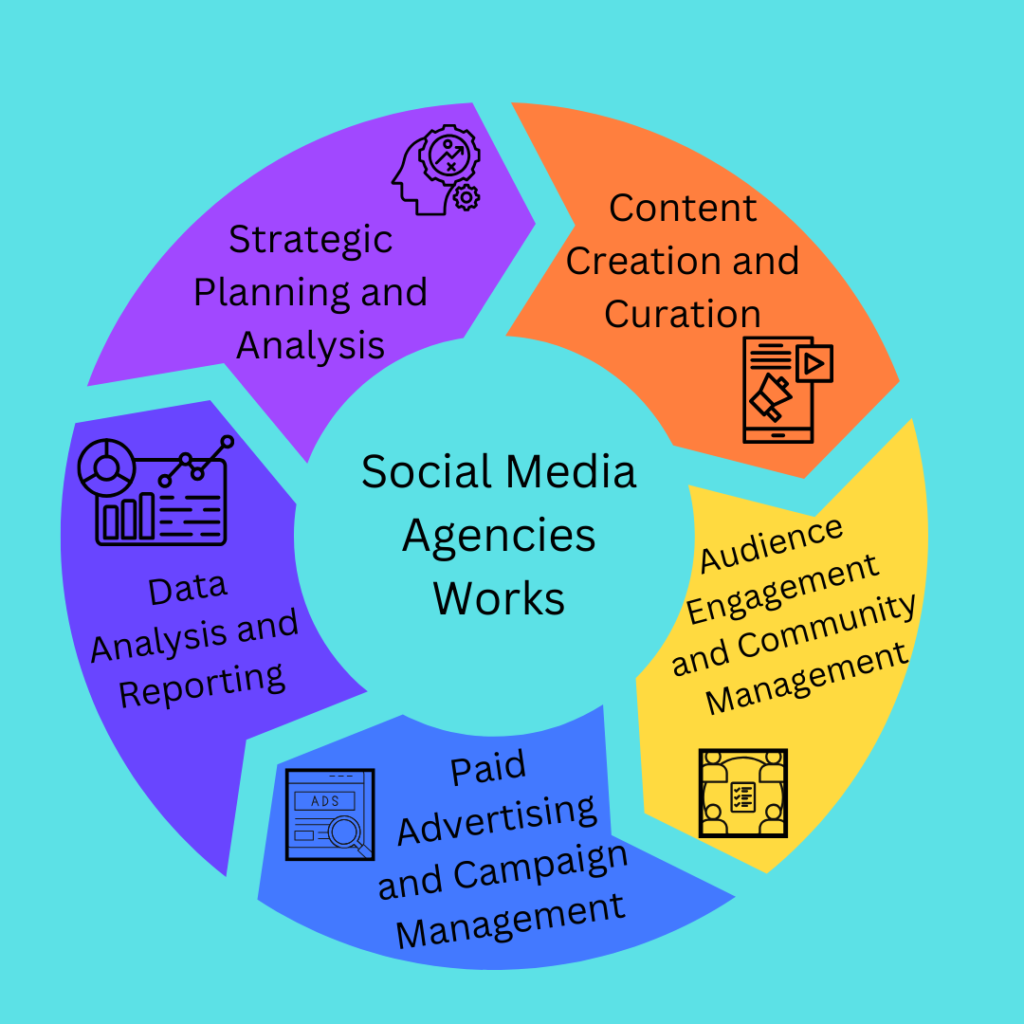Introduction
In today’s competitive digital landscape, social media agencies play a vital role in transforming brands and propelling businesses toward success. This comprehensive guide decodes what social media agencies do, how they work, and why they’re essential for growth. From strategy development to trend analysis, discover the essential steps agencies take to maximize brand potential and the current trends shaping the industry. Whether you’re a business owner considering agency support or a marketer aiming to understand the industry, this blog will provide valuable insights into the dynamic world of social media agencies in 2024.
Social media agencies have evolved into key players in the digital marketing ecosystem, helping brands navigate the complexities of online engagement, visibility, and growth. In 2024, these agencies are not only managing posts and ads but also driving data-informed strategies, creating viral content, and positioning brands as leaders in their industries. This blog delves into the role social media agencies play in shaping brands, the steps they take to ensure success, and the trends currently defining the field.

How Social Media Agencies Work
Social media agencies bring expertise, creativity, and strategy to the table. Here’s a breakdown of the core functions they perform:
Social media agencies bring expertise, creativity, and strategy to the table. Here’s a breakdown of the core functions they perform:
1. Strategic Planning and Analysis
- Social media agencies start by thoroughly understanding a brand’s goals, audience, and unique selling points (USPs). They conduct extensive market research and competitor analysis to identify trends and gaps in the industry.
- The agency uses this data to create a tailored social media strategy, outlining specific goals such as increasing engagement, driving traffic, or boosting sales.
2. Content Creation and Curation
- The key to success on social media is content. Agencies often employ skilled designers, copywriters, and video editors to create engaging content that resonates with target audiences.
- They ensure the content is aligned with the brand’s tone and aesthetic, helping to strengthen brand identity while also keeping content varied and engaging.
3. Audience Engagement and Community Management
- Social media agencies monitor interactions on social channels, responding to comments, messages, and mentions to foster positive relationships with customers.
- They also develop strategies to engage audiences through polls, giveaways, and live sessions, turning followers into loyal brand advocates.
4. Paid Advertising and Campaign Management
- Paid social media campaigns are critical for boosting brand reach. Agencies handle everything from ad design to targeting and A/B testing, ensuring ads reach the right demographics at the right time.
- They continuously analyze ad performance and optimize campaigns to maximize return on investment (ROI).
5. Data Analysis and Reporting
- Using analytics tools, agencies track key metrics like engagement, impressions, and conversion rates. This data helps them understand what works and what doesn’t, allowing for continuous refinement of strategies.
- Monthly or quarterly reports provide clients with transparency, showcasing the value that the agency’s efforts bring to the brand.

Necessary Steps to Take When Working with a Social Media Agency
If you’re considering hiring a social media agency, here are the key steps to ensure a successful partnership:
1. Define Clear Goals and Expectations
- Identify your objectives, whether they’re brand awareness, lead generation, or customer retention, and communicate these clearly to the agency.
2. Choose the Right Agency for Your Brand
- Research agencies that specialize in your industry or have a track record with similar clients. Look for agencies with experience in your preferred social platforms and ones that understand your target audience.
3. Establish a Realistic Budget
- Determine how much you can invest in social media marketing, including both organic and paid strategies. Agencies often offer tiered services, so discuss options that align with your budget and goals.
4. Collaborate on Content and Strategy
- Work closely with the agency to ensure your brand’s voice and values are authentically represented. Provide feedback on initial drafts and strategies to ensure alignment.
5. Set Up Regular Communication and Reporting
- Schedule regular check-ins to review progress, discuss challenges, and adapt strategies as needed. Regular reporting helps maintain transparency and accountability.
The Role of Social Media Agencies in Business
Social media agencies are essential to modern businesses for several reasons:
- Enhancing Brand Awareness
Through consistent and strategic posting, social media agencies help brands reach wider audiences and create memorable digital impressions, building a stronger brand identity over time. - Generating Leads and Driving Sales
With advanced targeting techniques and conversion-focused content, social media agencies are able to attract potential customers and convert them into paying clients. - Improving Customer Relations
Agencies handle interactions professionally, addressing customer queries and concerns quickly. This support helps to build a positive brand reputation and fosters long-term customer loyalty. - Accessing Data-Driven Insights
Agencies utilize data analytics to track campaign performance, enabling businesses to make data-informed decisions and optimize for better outcomes. These insights give brands a competitive edge by revealing audience behavior trends and preferences. - Staying Updated with Trends
Social media is a rapidly evolving space, with new features and algorithms frequently emerging. Agencies stay on top of these changes, ensuring brands remain relevant and competitive.
Trends Shaping Social Media Agencies in 2024
As the social media landscape evolves, agencies are adapting to new trends to keep brands at the forefront:
1. AI-Powered Content Creation and Analytics
- AI tools are increasingly being used for content generation, from chatbots that handle customer service to AI-driven analytics that predict audience behavior. This helps agencies create more personalized and data-driven content.
2. Emphasis on Short-Form Video Content
- Platforms like TikTok and Instagram Reels have cemented the popularity of short videos. Agencies are focusing on creating short, impactful video content that engages audiences quickly.
3. Influencer Partnerships and User-Generated Content (UGC)
- Collaborating with influencers and leveraging UGC has become essential for authenticity. Agencies are facilitating partnerships that align with brand values, which resonates well with audiences seeking real experiences.
4. Interactive Content and AR Experiences
- Interactive content, such as quizzes and polls, drives engagement and fosters a more personal connection with audiences. Augmented reality (AR) features also add a unique, immersive dimension to brand experiences.
5. Sustainability and Social Responsibility
- Modern consumers are conscious of sustainability and social impact. Social media agencies are helping brands showcase their commitment to responsible practices, creating content that aligns with these values.
Conclusion
Social media agencies have become indispensable in helping brands thrive in a digital-first world. By expertly navigating platform algorithms, creating engaging content, and implementing data-backed strategies, these agencies drive measurable results and enhance brand presence. For any business looking to grow its digital footprint and connect with modern audiences, partnering with a social media agency in 2024 offers a strategic advantage.


